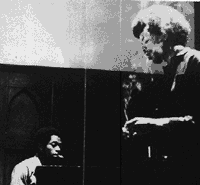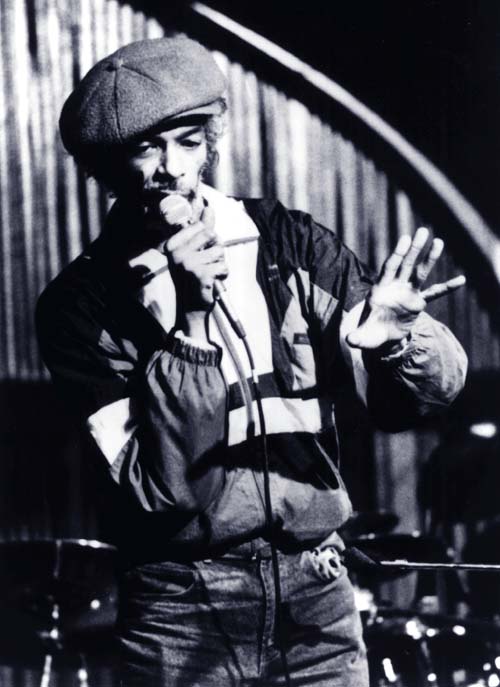GIL SCOTT-HERON & BRIAN JACKSON / “Rivers Of My Fathers”
In the last passage of one of Toni Morisson’s best-known novels, a young Black man named Milkman Dead steps off of the side of a cliff and either does or does not fly. It’s been twenty years since I read Song Of Solomon and at this point, I don’t remember much about it. The one thing about the book I’ve never forgotten is the final image: that of a Black man flying home. Not only have I remembered the image all these years, I’ve internalized it in a way. Sometimes I dream about flying, usually across open water, and I have friends and family who have had the same dream. In African-American culture, the image of a man or woman flying away to some far-off land is as common as it is archetypal. Given the way most Black Americans arrived here in the Americas, it’s easy to understand where and how the myth originated. It isn’t as easy to understand it’s persistence.
For me, Gil Scott-Heron’s “Rivers Of My Fathers” captures the essence of ‘the flying dream’ better than anything else I’ve seen or heard save the dream itself. The lyrics, the melody, the arrangement—all of it gives me the same feeling I get whenever I think of Milkman standing high above everything, waiting for weightlessness to spirit him away.
 “Rivers” begins with drummer Bob Adams’ swing-style rim shots and pianist Brian Jackson’s wide, blocky chords, as the two play in a style that even non-music aficionados will recognize as ‘the blues.’ Brian comps over the groove for nearly two minutes before Gil begins to sing: “Looking for a way out of this confusion.” Though “Rivers” evokes feelings of flying, Gil never mentions the sky, mountains or wings. Instead, Gil uses a water motif—another archetypal metaphor in African-American culture. For African slaves in North America, water evoked both feelings of home and the promise of freedom. The reason water evoked feelings of home is obvious—slaves arrived in the Americas only after being packed (toe-to-head, like cargo) onto ships at the Western shores of Africa and shipped thousands of miles across the Atlantic Ocean. Water also held the promise of freedom: escaping slaves used the rivers both as markers of direction (most run North/South) and as a way to hide their scent from the hound dogs. In “Rivers Of My Fathers,” Gil taps into the depths of these centuries-old feelings to express the frustrations of a modern urban dweller. Gil sings of “looking for a way out” out of the cold, hard city; he wants to “lay down by a stream” that is “miles away from everything.” But he’s too far away from home, there is no way out—instead of warm, open fields and flowing waters, there is only brick, asphalt and mortar. “The concrete is my smile,” Gil sings. “I’ve got to change my way of living. Got to change my style.”
“Rivers” begins with drummer Bob Adams’ swing-style rim shots and pianist Brian Jackson’s wide, blocky chords, as the two play in a style that even non-music aficionados will recognize as ‘the blues.’ Brian comps over the groove for nearly two minutes before Gil begins to sing: “Looking for a way out of this confusion.” Though “Rivers” evokes feelings of flying, Gil never mentions the sky, mountains or wings. Instead, Gil uses a water motif—another archetypal metaphor in African-American culture. For African slaves in North America, water evoked both feelings of home and the promise of freedom. The reason water evoked feelings of home is obvious—slaves arrived in the Americas only after being packed (toe-to-head, like cargo) onto ships at the Western shores of Africa and shipped thousands of miles across the Atlantic Ocean. Water also held the promise of freedom: escaping slaves used the rivers both as markers of direction (most run North/South) and as a way to hide their scent from the hound dogs. In “Rivers Of My Fathers,” Gil taps into the depths of these centuries-old feelings to express the frustrations of a modern urban dweller. Gil sings of “looking for a way out” out of the cold, hard city; he wants to “lay down by a stream” that is “miles away from everything.” But he’s too far away from home, there is no way out—instead of warm, open fields and flowing waters, there is only brick, asphalt and mortar. “The concrete is my smile,” Gil sings. “I’ve got to change my way of living. Got to change my style.”
 Several times during the eight-plus minutes of “Rivers,” Gil lays out for whole choruses at a time, letting the dark-blue groove carry us along, unhurried, uninterrupted. Eventually, Gil addresses the river directly. “Please,” he beseeches the water, “Please, point my way home! Could you carry me home?” Fittingly, it isn’t until the last moment of “Rivers” that Gil finally names the place he wants the waters to carry him: “Africa.”
—Mtume ya Salaam
Hey man, let me borrow your space ship
Clichés are merely truths repeated so often they have become boring. Great art invariably offers us a fresh way to view the truth. I know why Mtume considers this piece a classic: though this was recorded when Mtume was a baby, it resonates with him now that he is in his thirties, feeling the weight of youth slipping away and adult responsibilities crashing into world realities thwarting his dreams, whatsoever his dreams may be.
Of course, that is pop psychology but it is also a precise mapping of the saudade felt by many who went to sleep as youth and are now waking up as middle-aged adults. Call it the decade after. It happened so quickly—where did the time go? Where, the thinning hair, the thickening waist? What happened? Your lover. Your spouse. Now your ex. The college jersey you wore at least once a week, now an article of clothing shoved to the end of the closet—too emotionally dear to throw away, not appropriate any longer for everyday wear, or maybe you still wear it even though you know those days are long gone. Which really is what Gil’s song is about: days long gone.
Long gone.
Africa.
America’s obsession with youth culture makes adulthood that much more difficult. And when you pile on race and class, well, sometimes it makes you want to borrow a spaceship and fly…
—Kalamu ya Salaam
Several times during the eight-plus minutes of “Rivers,” Gil lays out for whole choruses at a time, letting the dark-blue groove carry us along, unhurried, uninterrupted. Eventually, Gil addresses the river directly. “Please,” he beseeches the water, “Please, point my way home! Could you carry me home?” Fittingly, it isn’t until the last moment of “Rivers” that Gil finally names the place he wants the waters to carry him: “Africa.”
—Mtume ya Salaam
Hey man, let me borrow your space ship
Clichés are merely truths repeated so often they have become boring. Great art invariably offers us a fresh way to view the truth. I know why Mtume considers this piece a classic: though this was recorded when Mtume was a baby, it resonates with him now that he is in his thirties, feeling the weight of youth slipping away and adult responsibilities crashing into world realities thwarting his dreams, whatsoever his dreams may be.
Of course, that is pop psychology but it is also a precise mapping of the saudade felt by many who went to sleep as youth and are now waking up as middle-aged adults. Call it the decade after. It happened so quickly—where did the time go? Where, the thinning hair, the thickening waist? What happened? Your lover. Your spouse. Now your ex. The college jersey you wore at least once a week, now an article of clothing shoved to the end of the closet—too emotionally dear to throw away, not appropriate any longer for everyday wear, or maybe you still wear it even though you know those days are long gone. Which really is what Gil’s song is about: days long gone.
Long gone.
Africa.
America’s obsession with youth culture makes adulthood that much more difficult. And when you pile on race and class, well, sometimes it makes you want to borrow a spaceship and fly…
—Kalamu ya Salaam
This entry was posted on Sunday, September 18th, 2005 at 12:01 am and is filed under Classic. You can follow any responses to this entry through the RSS 2.0 feed. You can leave a response, or trackback from your own site.
5 Responses to “GIL SCOTT-HERON & BRIAN JACKSON / “Rivers Of My Fathers””
September 18th, 2005 at 5:52 am
Just letting people know that if they are interested in that ‘George Bush’ track – the group record under the name K-Otix and have released 2 albums. Dope Underground Intelligent Hip-Hop
September 19th, 2005 at 2:21 am
In Songhoy cosmology, Africans fly. The river motif is also deeply engrained in the psyche of Songhoy people and other Africans. Just to say that we Africans brought with us more than memories of our Holocaust. Thanks for the music and the care.
September 21st, 2005 at 8:54 am
That Kanye remix is OFF THE HEEZY 4 SHEEZY!!! How can I buy it? That’s going to be my Kwanzaa gifts for the year, bet!
Keep up the good work!
April 2nd, 2006 at 2:48 pm
Gil:me encanta tu musica hermano. Dios quiera que te pueda ver por Argentina alguna vez.
December 30th, 2011 at 3:06 am
Dear Mtume ya Salaam
I have never read a better take on the great Gil Scot Heron. You are obviously leaps and bounds beyond some of the other commentors, especially he one that talks of space ships. Not to put that commentor down, this person’s life experiences are different and probably such that would disqualify himor her from commenting on African American life experiences.
I am a lifelong fan of Gil Scot Heron, Brain Jackson and the Midnight Band, in fact they performed for our homecoming celebration at Morehouse College in 1974. I beleive that Gil was also a member of of gruop known as the Last Poets.
Leave a Reply
| top |